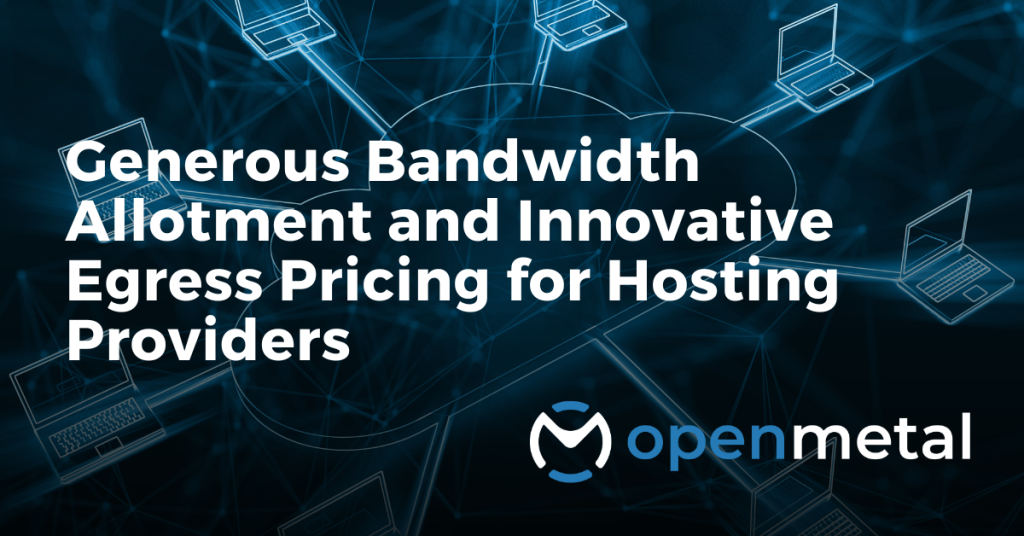Bandwidth Needs for Hosting Providers
For a hosting provider, uplink capacity refers to the amount of data that can be transferred from their servers to the internet within a given time frame and usually measured in Gigabits per second (Gbps). Bandwidth Allotment, on the other hand, refers to the total amount of data transfer allowed over a certain period (usually per month) without incurring additional costs. It is typically measured in terabytes (TB) per month or similar metrics, indicating the cumulative data that can be moved in and out over a set duration. Having both decent uplink capacity and bandwidth allotment is especially critical for enterprise hosting providers looking to appropriately service their customers with substantial web traffic, content delivery needs, and data-intensive applications.
- A combination of high uplink capacity and bandwidth allotment allows for hosting providers to support their customers with content-rich sites and media delivery platforms to handle a large number of simultaneous visitors accessing images, videos and even data files without degradation in performance.
- Another area that high uplink capacity and bandwidth allotment is critical is to help web hosting providers maintain failover setups including mirrored services and disaster recovery solutions. High uplink capacity facilitates moving large volumes of data between multiple data centers / clouds to conduct data syncing, replication and data backups.
- Hosting providers also have to account for possible traffic spikes that correspond to their customers peak business hours or special events. Having access to sufficient high uplink capacity / bandwidth allotment helps maintain the consistency of the hosting service provided, even when under load.
Challenge: High Data Egress Costs
Under traditional infrastructure pricing models, these high uplink capacity / bandwidth requirements correspond to high data egress costs. Data egress charges can accumulate quickly, especially for hosting providers dealing with heavy content, backups, or global audiences. In many cases the costs are unpredictable and cause large fluctuations in data egress bills especially if the included bandwidth allotment does not meet the hosting provider’s needs.
OpenMetal Solution: Generous Bandwidth Allotments and Unique Data Egress Pricing Model
OpenMetal receives frequent enquiries from hosting providers whose data egress costs are sometimes 20-30% of their overall infrastructure bill, and who are looking to optimize or reduce these costs without sacrificing the quality of their service.
One such hosting provider came in with a bandwidth requirement for 350 TB/month which they were currently paying for with their existing provider. Given their specific needs for CPU, RAM, and storage, the optimal solution with OpenMetal was a cluster of three Large V4 servers.
- Each Large v4 server includes: 2x Intel Xeon Gold 6526Y processors, 2x 6.4TB NVMe drives, 2x 960GB Boot Disk and 512GB DDR5 5200MHz RAM.
- Each server also has the following egress allotment – at no extra cost: 20Gbps of private bandwidth and 4Gbps (recently updated from 1Gbps) of public bandwidth.
- So the three servers in the above proposed solution have a total public bandwidth egress allotment of 12Gbps.
Calculated over the duration of a month, this comes to a monthly uplink capacity of 1,851.428 TB/ month – INCLUDED at no additional cost. This gave the hosting provider the option to completely eliminate their existing bandwidth costs while nearly doubling their current capacity, providing ample room for future growth.

Along with the generous included bandwidth allotment, OpenMetal’s unique and fair 95th percentile data egress pricing model allows for companies to eliminate unpredictable costs around bandwidth usage. Essentially, if the customer happens to go over their bandwidth allotment for the month, their service is not disrupted or throttled. They are only charged the difference in usage between the allotted bandwidth and 95% of the peak usage. This reduces the unpredictability of data egress pricing while also applying a fair model for bandwidth overages. This type of pricing model is common for bare metal environments, but OpenMetal is unique in that it has extended this to cloud environments too.
Use the OpenMetal data egress pricing calculator to calculate how much you could save on your data egress bills.
Questions? Schedule a meeting or start a chat.
Read More on the OpenMetal Blog




































